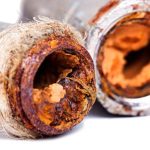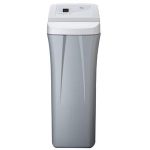Defining Corrosion and Ways to Get the Upper Hand
Corrosion is a form of chemical deterioration of metals through exposure to oxygen. Oxidation is another term for the process because the compounds formed in the corrosion process are known as oxides. One of the most commonly known oxides is iron oxide, aka rust.
Corrosion comes in many forms, but whether it’s pitting, scraping, or thinning the metal, it can lead to catastrophic failure of a home’s water pipes. Though corrosion cannot be reversed, the process can be slowed, stopped, or prevented if the proper precautions are taken. Corroded water pipes do not have to become a source of inconvenience or frustration.
Using Coatings and Protective Linings as Frontline Protection
 The pipes that make up a home's plumbing system are made of different materials depending on their function. PVC and PEX pipes are great and corrosion resistant, but there are times when a copper or steel pipe is still the best choice (for example, to connect to the hot water tank).
The pipes that make up a home's plumbing system are made of different materials depending on their function. PVC and PEX pipes are great and corrosion resistant, but there are times when a copper or steel pipe is still the best choice (for example, to connect to the hot water tank).
Perhaps an older home still has functioning iron pipes that should be protected rather than replaced. Coatings and protective linings are useful in these cases. Several different material types are used to bond to the inside of metal pipes, but all have their place depending on the situation. Below are a few examples:
- Aluminum: Aluminum is a corrosion-resistant metal often sprayed onto pipes to protect them. It requires high temperatures to apply.
- Epoxy: Sometimes used alone and sometimes used with a flexible medium, epoxy is a liquid resin or adhesive that can cure quickly to provide a protective layer.
- Zinc: Galvanization is often done for pipes during the manufacturing process. This adds a coating of zinc which is another corrosion-resistant metal.
Clearing the Water with a Water Softener

- Water enters the water softener through the supply line.
- The mineral salts (negatively charged) are attracted to the resin beads (positively charged) and precipitate from the water.
- The water (free of minerals) flows from the water softener into the home’s plumbing system.
- The resin beads are flushed with salts with a stronger negative charge, and the salts that were in the hard water are flushed through the home’s drainage system.
Professional Plumbing Maintenance
One of the simplest and most effective ways to verify that a home’s plumbing does not succumb to corrosion is by calling a professional to perform routine maintenance. A plumbing technician will also carefully examine a home’s pipes and provide recommendations when corrosion is present. They can catch any issues before they worsen and save a homeowner money and time.
About Falcon Plumbing
For over 25 years, family-owned and woman-owned and operated Falcon Plumbing has served the residents of Miami, FL, and the surrounding areas. They provide flat-rate pricing and 24/7 emergency service at no extra charge. Call them today for plumbing services in Miami, FL.
Distribution Links +
- htv10.tv
- wicz.com
- rfdtv.com
- snntv.com
- central.newschannelnebraska.com
- metro.newschannelnebraska.com
- midplains.newschannelnebraska.com
- northeast.newschannelnebraska.com
- plattevalley.newschannelnebraska.com
- panhandle.newschannelnebraska.com
- wpgxfox28.com
- lifestyle.mykmlk.com
- wtnzfox43.com
- lifestyle.3wzfm.com
- lifestyle.southernsportstoday.com
- lifestyle.thepodcastpark.com
- lifestyle.680thefan.com
- lifestyle.xtra1063.com
- lifestyle.953hlf.com
- lifestyle.rewind1019.com
- lifestyle.us983.com
- lifestyle.countrylegends1059.com
- lifestyle.967wshv.com
- lifestyle.1045thedan.com
- yournewsnet.com
- michigan.yournewsnet.com
- midwest.yournewsnet.com
- northeast.yournewsnet.com
- southeast.yournewsnet.com
- southwest.yournewsnet.com
- lifestyle.earl983.com
- west.yournewsnet.com
- lifestyle.maverick1023.com
- lifestyle.magic979wtrg.com
- lifestyle.1077lakefm.com



